- Home
- Peter Grainger
An Accidental Death: A DC Smith Investigation Page 2
An Accidental Death: A DC Smith Investigation Read online
Page 2
‘Awareness of?’
‘Drugs, talking to local sixth forms.’
‘Liaison with?’
‘Immigrant communities, specifically east European. There’s an issue developing with illegal distilling. We just want to put some plain clothes in front of them, let them know we’re taking it seriously.’
‘Fine.’
‘Really?’
‘Anything else? Any actual crimes as opposed to incipient ones?’
She passed him one of the folders. Opening it, he saw a familiar face straight away.
‘Budgie Budge? Is he out and at it already? How many more times does he want us to put him away? Still car key burglary?’
‘Two cases in the past fortnight, and he’s been out since June. It can’t be anyone else.’
‘What a bloody moron! Is this it?’
‘I did warn you. There’s one more thing that just needs a CID sign off really… The boy who drowned in the river near Upham. The PM’s been done, and it looks like an accidental. If you could read it through and finish the paperwork?’
This was odd. A CID officer would already have been involved in any death – there was no need for another to look at this if it was an accidental one.
‘The body is still here, in the police mortuary. The family was in yesterday, asking about funeral plans, understandably.’
‘So?’
She was back at her table now, moving photographs around like chess pieces, avoiding the eyes that she knew could, if necessary, out-search her own.
‘So I just need someone to finish the paperwork.’
For the past two years he and his team had owned a quarter share in room 17 – four large desks in there, about four times as many chairs, a couple of old-fashioned filing cabinets. Each desk had the now-obligatory PC – the jokes had worn out long ago – and keyboard, and the shared printer stood on the long work surface that ran the length of the side wall. Here too were stacks of box and lever arch files, and various piles of folders and papers, the detritus of past investigations. It was an odd system in that no desk was formally owned by or even allocated to a DC or a DS – it just sort of happened. Smith had half-expected that his desk would have been appropriated or that his new monitor would have been swapped by someone for a clapped out version but everything looked untouched. He opened the drawers one by one but the pens, pencils, paperclips and calculator were all present and correct – there was no evidence that anyone had even sat in his chair.
This room too was empty – perhaps they were all in hiding, planning to leap out and shout ‘Boo!’ as a welcoming surprise. He laid out the four items on his desk, left to right in a straight line, in the order of increasing interest. The immigrant liaison could wait – no timetable on it, no dates fixed, and, to be honest, if they were barmy enough to home-brew vodka and drink themselves blind, that was their choice. The drugs liaison work gave him less room; it was being shared out amongst officers and he only had five schools to visit but the dates had already been set up, one a week for the next five weeks. He checked his diary - all on Monday afternoons, after lunch when the kids would be hyper…
On the other hand, he’d spent half a lifetime clearing up the mess left behind by the drugs business, and if he only made one of them think each week, that would be five fewer potential mini-crimewaves walking the streets of Lake. Budgie Budge was a case in point; not even organised enough to be an addict, he lived the chaotic life of what the politicians call ‘the underclass’ – Smith had other words for it. Budgie’s only life-skill was knowing how to bend a coathanger through a letterbox to get the car keys off a hook. He would give him a nudge later in the week.
The first three items were slid together, tapped level and placed in the top left hand corner of the desk. Before he opened the final folder - which was rather thin, considering it must encapsulate all that was known about the end of a young life – Smith replayed the conversation with DI Reeve. He wanted to be sure that he hadn’t mis-read it. A routine case of accidental death – someone from CID had already been involved but she wanted Smith to finish the paperwork – and when he asked why she made a point of not giving him a convincing explanation. She was well aware of workload issues, and much too sharp to waste time on pointless duplication… Which must mean that she had already looked over the report and that there was something in it that bothered her. But she didn’t want to tell him, she wanted him to find it – or not to find it. Then she could tell herself, and anyone else who asked, that another experienced officer had reviewed the matter.
First he read quickly, beginning with the official documentation. It all seemed to be in order, and everything that needed to be there was there. He read for facts – times and places – avoiding for the moment the human tragedy that lay buried just beneath the surface of it all. He recognized the names of most of the officers who had had their weekend ruined, and saw that it was their regular pathologist who had completed the autopsy on the Monday – Robinson wasn’t the best he’d worked with but there was surely little enough to miss here. He noticed that the CID page, though completed, had not been signed but that was minor detail, easily rectified by checking the incident log – that was not what was bothering DI Reeve.
Next he read through the witness statements, beginning with the one from Melanie Carter. It seemed clear enough – the order made sense, the behaviour was that of a group of youngsters who had a little too much booze and a few too many hormones mixed up together on a hot afternoon. But she was intelligent – ought to be, in the sixth form which must still mean something – and there was a glimpse in her statement of the Fletcher boy’s real situation. He took out his current Alwych notebook and wrote her name in it. Before stepping down he had taken the precaution of ordering a supply of the old-style notebooks. These were for personal use; not left at work, they occupied the top of a row of shelves in his study – every case he had ever worked on was there.
Because she drew attention to them, he next read the statements of Steven Neale and Christine Terry, and these were consistent with Melanie Carter’s in all important respects; the minor differences were what he would expect to see if people were being honest and the officers taking the statements were doing their jobs properly. All mentioned the second canoeist but although he had not yet been traced, he had not been seen as significant in the subsequent brief investigation. The other witness statements were similar and he could see nothing in them to concern Alison Reeve.
Finally, he turned to the autopsy report. Wayne Fletcher had drowned – Smith understood enough of the grim scientific language to see that for himself. There had been enough alcohol in the bloodstream for it to be seen as a contributory factor, and not only that – there were positive results for cannabis, too. Silly boy… At some point he had banged his head, and, either unconscious or disorientated, he had taken on board too much water. But it’s difficult to bang your head that hard while you’re in the water, thought Smith. He must have got out, maybe dived back in and caught his head on a branch or some underwater obstruction. He read the paragraph again, slowly, thinking it through and that’s when he saw the neat little asterisk pencilled in above the word ‘bruising’. At the bottom of the page, another one and a short handwritten note: ‘Pointed out to Dr Robinson something odd about the bruise. A fish.’ There were initials – ‘O.M.’
Olive Markham. They had first spoken years ago when he was running investigations. He remembered teasing her about the initials, asking her if she was into meditation and all that sort of thing, and she had said that as a matter of fact she was. She had preached the virtues of it to him, and he had laughed it off, never guessing then that it might be of any use to him. Olive Markham, mortuary technician. She must be getting on, and even closer to retirement than he was. Writing on the report like that was out of order but she was something of an eccentric, so that wouldn’t bother her in the slightest. A fish? It was time to renew his acquaintance with Olive – he had no doubt that this was the deta
il that DI Reeve had wanted him to clear up before the paperwork was signed off.
Three people entered the office and two hands immediately came forward to be shaken. DCs John Murray and Maggie Henderson were The Odd Couple of Kings Lake Central; he was six feet four and eighteen stone, she five six and no more than nine. They disagreed about everything as a matter of course and yet were probably the best team on the detective force. After shaking Smith’s hand, Maggie said, ‘Oh, come here you sod!’ and hugged and kissed him. Before letting him go, she whispered, ‘And for Christ’s sake get us back into your team!’
Over her shoulder he could see the third officer, O’Leary, busy at his desk, finding reasons not to join in the welcome back. O’Leary was close to Wilson, and Smith knew that he would need to be careful about what was said in here and about what he left on or even in his desk. Eventually, O’Leary looked in his direction and nodded once – that would do for both of them.
Smith heard his name called and turned around. It was DI Reeve, standing in the doorway, and beckoning to him. When he reached her, he could see some way along the corridor – could see the figure of Waters waiting with that same air of uncertainty, watching the two of them.
‘David, there was something I forgot to ask you-’
He interrupted her without thinking, speaking quietly.
‘No, ma’am, not on my first day back! There are dozens of other people who could show him how things are done these days. He could probably tell me a thing or two about procedures!’
‘Perfect reason to do it then! Re-training for you. Seriously, just a day or two, if only so he can learn what not to do. He made a point of asking me.’
‘Asking you what?’
‘If he would get the chance to work with you.’
‘How? I only met him twenty minutes ago.’
‘No, not today. It was last week, Friday, his first day. He mentioned you – your fame goes far and wide.’
Smith’s hesitation gave her the room she needed – ‘Show him some of the ropes, DC. He’s bright and keen – you won’t need to tell him anything twice. OK? Thanks. Chris – DC Waters!’ and she beckoned the young detective down the corridor towards them.
This was the last thing he needed – a fresh-faced, callow youth tagging along behind him everywhere he went. Smith had trained plenty in his time, but that was the point – his time had been and gone. He knew it, everybody knew it; not really belonging in the modern police service, he was the proverbial dinosaur, tolerated because he could still turn in a decent result, usually because he did not follow the strict letter of the laws that laid down how things were to be done these days. How was he supposed to work like that and train a puppy at the same time?
Waters sat on one of the spare chairs drawn up alongside Smith’s desk, watching the monitor as Smith took him through the basic options available to any officer after logging on; it was obvious that Waters was more knowledgeable about that business than Smith had ever been but at least this gave the older man time to think. Was there any way out of it? Could he yet find some argument that would persuade DI Reeve to pass Waters on to someone else?
Nothing came to mind, and now Waters was looking at him expectantly, no doubt waiting for them to begin investigating – if not a murder, then at least a bank robbery. Smith reached for the four folders again and explained to Waters just how exciting the work of a detective could be at ten o’clock on a Thursday morning in August. At the back of his mind Smith was still puzzling over how the boy had asked about working with him before they had even met. Had someone primed him, put him up to it as some sort of a joke? No-one amongst the few people that Smith trusted would have done that; had someone from the dark side got to him already?
Inevitably, they ended up looking at the file about the drowned student. Smith explained the basic procedures and about how CID were always involved in such cases. It would go before the coroner and their role was to make it clear that no suspicious or unexplained circumstances attached to the boy’s death; that being the case, it would eventually be pronounced as an accidental one. Smith asked Waters whether he had ever seen a dead body and the answer was no, he had not.
‘Well, perhaps best not to start with this one. You can’t be much older than Wayne Fletcher was.’
Waters didn’t react to that at all. Instead he said, ‘So this is just routine?’
‘I don’t know about that. It’s hardly a routine way to go at seventeen, is it?’
‘I mean, what you’re doing with it. You’ve read it through and now you’re going to sign it off and it ends up in the coroner’s court.’
‘Well… That’s the procedure, normally.’
Waters raised an eyebrow but said nothing.
‘Why do you ask? What would you do any differently?’
Waters had, Smith had already noticed, the habit of looking away into space when he was thinking something over, as if he had lost interest. There was silence for several seconds.
‘You can speak out. You’re bound to make plenty of mistakes, so you might as well get started on them, get some of them out of the way.’
‘OK. I don’t see how he got the head injury, not in the water, which was the last place he was seen. How can anyone swim fast enough into anything to bang their head that hard?’
Smith remembered Alison Reeves’s words about the new boy. They were more than thirty years apart, one on the verge of senility, the other just out of the classroom and both had seen it; Wayne Fletcher’s injury was not impossible but it was odd.
‘So what do we do?’
‘I don’t know.’
‘First we talk it through some more, just you and me. We kick it about and see what happens. Put forward any ideas, however daft, anything that comes into your head. Make a list of the ways someone might get a bang on the head in the river. Scribble it all down on bits of paper. I’m sure there’s a posh name for it… Used to call it brainstorming but that’s not pc now. You’re not epileptic by any chance? Anyway, the first thing we need is coffee. Strong, not a lot of milk, no sugar.’
Chapter Three
If Waters had noticed Olive Morton’s cryptic note, he never mentioned it, but in other respects he was sharp. Smith learned that after graduating he had joined the force; he had already been placed on the accelerated development scheme, meaning that somebody somewhere thought he was destined for great things. He was not afraid to question some of the ideas that Smith put forward, some of which were deliberately daft, just to see if he would, but he did so sensibly, respectfully, in a way that would encourage more senior officers to work positively with him. And he had ideas of his own – an unreported motor boat might have hit Fletcher; he might have dived or fallen into the water, hit his head on a tree trunk or some underwater object.
‘What about the mystery canoeist?’ said Smith.
‘I don’t see how anyone could paddle a canoe fast enough to knock someone out in the water.’
Smith nodded in agreement and left him to think it over as he drank the lukewarm last of the second mug of coffee. Waters stood up and walked over to the window – they had been sitting at the desk for more than an hour.
‘Perhaps Wayne was a good swimmer. Perhaps he caught up with the canoe…’
Smith shuffled the papers together and put them back into the file, adding in the rough notes that they had made as they talked it over.
‘We’ve exhausted this lot. We need more data, more gen. Let’s phone some people up. Phone the school this lot go to, St Martin’s, Upham. I’ve got to go there next week, would you believe, and lecture them about the dangers of drugs… Another of life’s delightful little ironies. I know they’ll not be open yet but find a number, get hold of the principal or a senior teacher. Make up some reason why you’ve had to call – professional courtesy before speaking to their students again about Wayne Fletcher’s tragic death – that should go down well. But what you’re after is a bit of background on these two.’
He flicked
the folder open again – ‘Melanie Carter and Steven Neale. How are they seen by the school, the teachers? Honest? Reliable? Mature? Are they academic, university types? How well should they have known Wayne Fletcher? Make sure we’ve got phone numbers for both of them. In fact, give them a ring, too, and see if they’re available this afternoon, just a routine follow up. If they are, tell them we’ll ring back with a definite time.’
Waters was making notes as Smith ran through it. When he finished, he looked up.
‘Are they – suspects?’
Smith couldn’t hide a smile.
‘I doubt it. But on the other hand, we don’t know what happened, do we? So we don’t rule anything out. Use O’Leary’s desk, he won’t mind.’
Frosty Winters was reading the memo for the fourth or fifth time when the phone on his desk began to ring. He didn’t want to answer it, didn’t particularly want to do anything apart from drive to the county police headquarters and kick down the door of Assistant Chief Constable Devine’s office before telling him exactly where he could stick his reorganization strategy.
‘DS Winters – if it’s a diver you want, try Chelsea Football Club.’
‘Frosty? What are you on about?’
‘Who is this?’
The voice was half familiar, a voice from the past.
‘Smith.’
‘Which one?’
‘Oh, this is doing wonders for my self-esteem! How many Smiths do you actually know who would ring you up, recognize your voice and still want to talk to you, knowing how ugly you are?’
‘DC?’
‘Thank you.’
‘Christ! I heard you were still at it. At Kings Lake? Been a bit of bother over there?’
‘Nothing to do with me, I was at home watching television with the cat. No-one can corroborate my statement, which is how I prefer things these days.’
‘How are you, DC?’
‘Can’t complain, Frosty. Or rather, I can’t be bothered to complain any more. No point.’

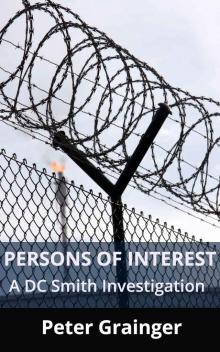 Persons of Interest
Persons of Interest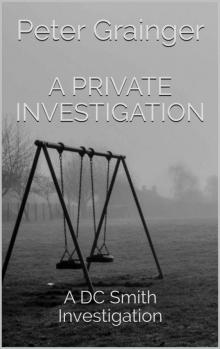 A Private Investigation
A Private Investigation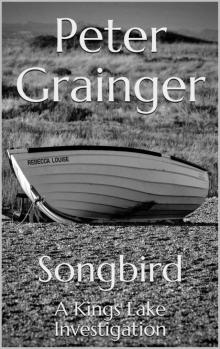 Songbird
Songbird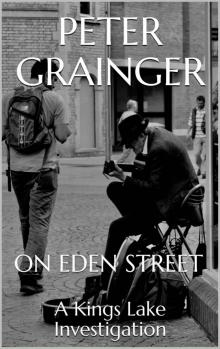 On Eden Street
On Eden Street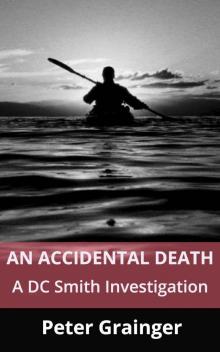 An Accidental Death
An Accidental Death Time and Tide
Time and Tide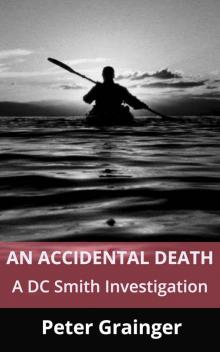 An Accidental Death: A DC Smith Investigation
An Accidental Death: A DC Smith Investigation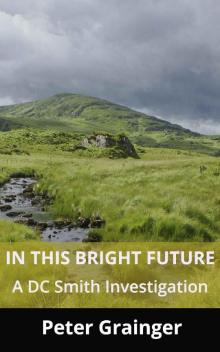 In This Bright Future
In This Bright Future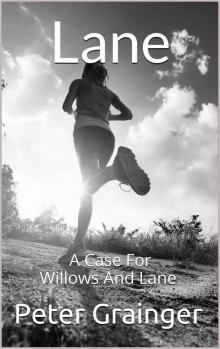 Lane: A Case For Willows And Lane
Lane: A Case For Willows And Lane The Rags of Time: A DC Smith Investigation
The Rags of Time: A DC Smith Investigation Luck and Judgement
Luck and Judgement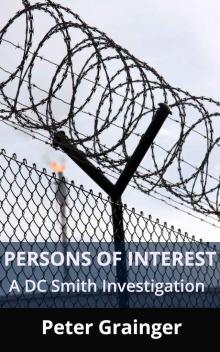 Persons of Interest: A DC Smith Investigation
Persons of Interest: A DC Smith Investigation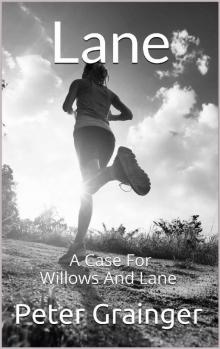 Lane
Lane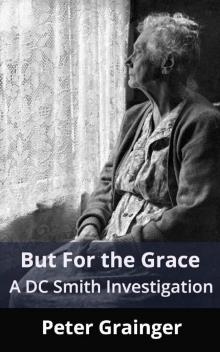 But For The Grace
But For The Grace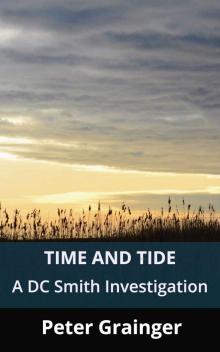 Time and Tide: A DC Smith Investigation
Time and Tide: A DC Smith Investigation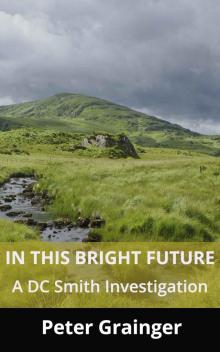 In This Bright Future: A DC Smith Investigation
In This Bright Future: A DC Smith Investigation The Rags of Time
The Rags of Time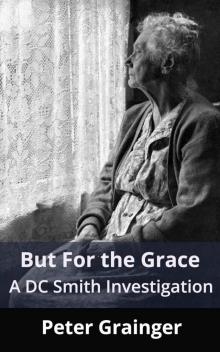 But For The Grace: A DC Smith Investigation
But For The Grace: A DC Smith Investigation Luck and Judgement: A DC Smith Investigation
Luck and Judgement: A DC Smith Investigation